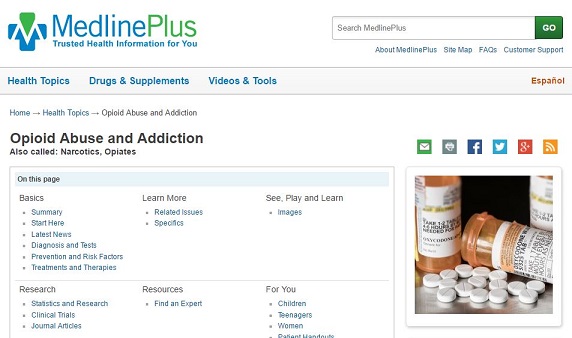The abuse of opioids (both prescription and illegal) is a major public health crisis in the US. The Centers for Disease Control describe how 91 Americans die every day from an opioid overdose, and the number of opioid overdose deaths have quadrupled since 1999. More overdoses are occurring at public libraries, which leads to the question: what roles should librarians have in helping to prevent and treat opioid abuse?
Public Libraries Preventing and Treating Overdoses
A coworker recently shared a fantastic article with me from American Libraries (a publication of the American Library Association) by Anne Ford, called “Saving Lives in the Stacks.” The article describes how many public libraries are taking active steps to prevent overdoses onsite, such as:
- Monitoring public bathroom use (to prevent overdoses in restroom stalls).
- Training staff to administer Narcan (generic name naloxone), a medication that can reverse the life-threatening effects of opioid overdose while waiting for emergency services to arrive.
Public librarians often take on a wide variety of roles, ranging from teacher to program planner, but do librarians also need medical training to act as first responders? This question raises legal and ethical issues beyond what I’m able to answer myself, but there is one role that I’m confident librarians can fill during this public health crisis: as information providers.
Information on Opioid Addiction and Treatment
Medical, academic, and public librarians are working to create a range of online information tools for both the general public and for healthcare professionals on preventing and treating opioid addiction:
- Medical Libraries: The National Library of Medicine (NLM) provides a list of reliable resources for the general public on MedlinePlus about Opioid Abuse and Addiction, including diagnosis, prevention, treatment, and statistics/research. Researchers and healthcare professionals can explore across a variety of NLM databases for information on different types of opioids and on naloxone through the Drug Information Portal. The National Network of Libraries of Medicine (NNLM) also provides a a useful list of Opioid Addiction Resources from the National Library of Medicine and Connected Sites.

- Academic Libraries: A number of health science libraries at universities across the US provide LibGuides related to opioid addiction and treatment (especially prescription guidelines for healthcare professionals), such as University of North Carolina at Chapel Hill and University of Pittsburgh.
- Public Libraries: Some public libraries also provide LibGuides or online lists about opioid prevention and treatment resources (especially information on local resources), such as the Westport Library in Westport, CT or the Memorial Hall Library in Andover, MA.
Public librarians, especially those who have to handle actual overdoses and even provide emergency medical treatment, are true heroes in this battle, and all libraries (including academic and medical) can work to provide reliable information to the public and healthcare professionals on prevention and treatment resources for opioid addiction.